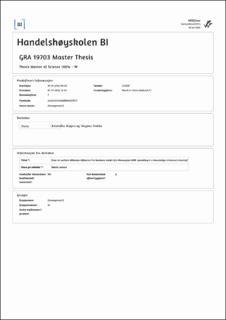| dc.description.abstract | MNEs increasingly face difficult decisions regarding incorporating different ways
to manage vertical alliances and adapt their business model. It is well established
that firms must coordinate activities in technologically innovative environments
and collaborate with customers and suppliers to align their business model in a
rapidly changing business environment. This study aims to investigate how
vertical alliances influence the business model of a Norwegian MNE operating in
a knowledge-intensive industry.
Research on business models has shown that the concepts of creating and
capturing value are central in identifying and understanding the activities of a
firm. Similarly, alliance literature has identified how firms relate to alliances to
create and capture value. As a result, this study aims to explore and understand the
implications of how firms' activities create and capture value in vertical alliances.
To best meet the research objectives, we interviewed one ship design firm, three
supply firms, and two shipowners in the ship design industry. Interviewees were
selected based on their ease of availability, and we analyzed responses using Excel
and tables to obtain logical results. Results revealed different interpretations of
how vertical alliances influence the business model on different levels, using the
ship design process as a reference to comprehend the business model.
The results suggest that knowledge and learning strongly influence the BM of an
MNE due to the importance of knowledge-sharing and learning environments for
firms to accumulate knowledge essential for developing unique products and
services. On this basis, technology-focused alliances, especially in
knowledge-intensive industries, should be taken into account when managing and
adapting the business model to optimize products and services. These findings
contribute to the literature on business models, vertical alliances, and recent work
investigating their interaction. | en_US |
